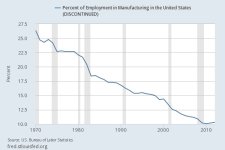Our living standard is higher because we opened our markets.
And record-low inflation.
The opening of our markets was done to suppress the wages in the US to increase profits and to increase the incomes of the already rich.
The actual result was to increase the standard of living of everyone by keeping down prices for ALL consumers, which is the whole country. 300,000,000 consumers vs. a few million wage-earners who might have got hurt in the increased competition, like low-performing companies are sometimes hurt by the competition.
It exposed the wages of the US workers to competition from the low wage countries like Mexico and China.
Good! More competition makes 300 million consumers better off.
It is the largest foreign aid program in history that has transferred trillions of dollars out of the US economy in lost wages, . . .
But that's a subsidy to US consumers and a cost imposed onto the consumers in those countries exporting to the US. So there's no net transfer either way. Except that the general standard of living is higher in the US. And some of those countries are shooting themselves in the foot by forcing their consumers to pay higher prices.
. . . and it caused widespread unemployment in the US, as the good paying jobs left.
Just like with automation, the uncompetitive overpaid jobs can decrease, as we get more competitive production and improve the service to consumers. That can come at the cost of some lost jobs which were uncompetitive and overpaid. ("good paying jobs" = uncompetitive overpaid jobs)
The idea that somehow "good-paying jobs" are automatically better is bone-headed nonsense. To be better they also have to be high-value-producing jobs where the wage is a result ONLY of the higher value of the worker and not an artificial subsidy such as from protectionism or other ways to artificially prop up wages. When you overpay someone -- pay them more than their value -- that's "good-paying" but not good for the economy, because it's bad for consumers, which is ALL of us.
It was done in the name of neoliberalism and its economics, supply side economics, that was suppose to build our economy by making more money available for investment in our economy.
No, it was done in the name of a higher standard of living, which comes from increased competition as a result of more trade.
It boosted the economy of China but our economy is in worse shape than it was under the previous Keynesian economic policies.
Keynes was mostly pro-free-trade. But if we connect Keynes with debt, which he favored, the economy is more Keynesian today than ever.
If anything has gone wrong with the economy (or is going to go wrong, like a coming CRASH!), it's more likely a result of the high debt rather than trade policy.
I hate to be this way, but, I told you so.
So you predicted this good windfall consumers have been enjoying as a result of these liberal trade policies? You're right -- consumers (ALL of us) have never had it so good.
And the record-low inflation is phenomenal. The Fed has trouble trying to PUSH UP the inflation rate, whereas in earlier times, before so much trade, they had trouble trying to control it.
So, GOOD FOR YOU if you predicted all these great benefits we're enjoying as a result opening our markets. And watch prices soar, and living standard fall, if whichever demagogue wins puts Bernie's ideas into practice (as they are threatening but maybe won't do because they are only pandering to crybabies in the Rustbelt for their votes).

